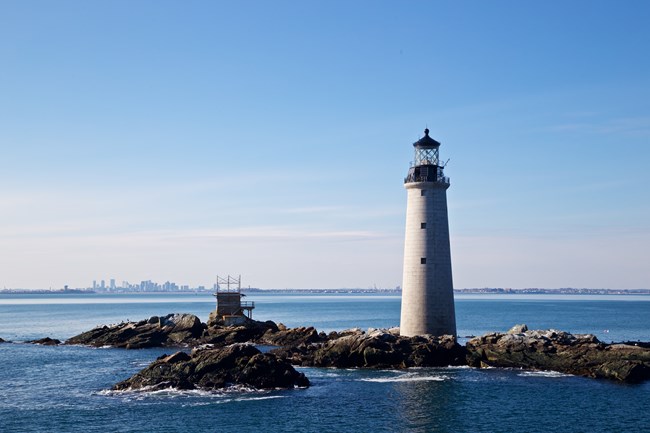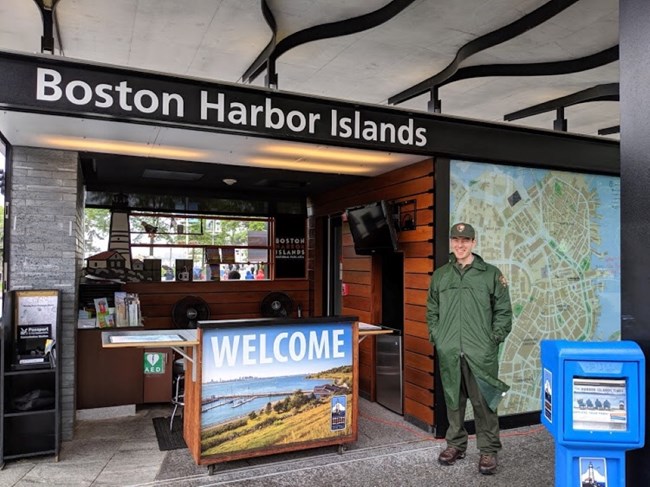
Liz Cook (Boston Harbor Now) Boston Harbor Islands Enabling LegislationNational parks operate within a legal framework that applies to all units that make up the national park system. In addition, specific legislation authorizes and defines a particular park. Regulations and policies further describe how parks are to be managed. More information about policies at Boston Harbor Islands can be found at "Boston Harbor Islands Partnership." The Boston Harbor Islands enabling legislation is intended to foster the goals of current land managers, including the Commonwealth of Massachusetts which had first acquired an island in the late 1950s. In 1970, the Commonwealth had passed legislation[1] that provided for the systematic acquisition of selected islands in Boston Harbor for recreation and conservation purposes.The Boston Harbor Islands were added to the National Park System in 1996 by a section of the National Parks and Public Lands Management Act of 1996 which was enacted as Public Law 104-333. The park legislation was amended in 1998 with authorization to acquire, in partnership with other entities, a conservation easement at Thompson Island;[2] with technical corrections in 2000 and 2004;[3] and again in 2009 to clarify the authority of NPS to enter into agreements with entities represented on the Boston Harbor Islands Partnership.[4] In 2006, the Commandant of Coast Guard was named as the appointing official for the U.S. Coast Guard representatives on the Boston Harbor Islands Partnership.[5] Generally, the 1996 legislation requires that the park be administered in cooperation with the private sector, with municipalities surrounding Massachusetts and Cape Cod bays, and with historical, business, cultural, civic, recreational, and tourism organizations. Basic tenets of the 1996 park legislation are that: "The recreation area shall be administered in partnership by the Secretary [of the Interior], the Commonwealth of Massachusetts, City of Boston and its applicable subdivisions and others in accordance with the provisions of law generally applicable to units of the National Park System…." Toward that end, the legislation established the Boston Harbor Islands Partnership. Other Specific MandatesClosely allied with partnership management is the legislative requirement that federal funding for the Boston Harbor Islands be matched by nonfederal funding. All federal funds that may be appropriated over time to implement the 1996 law may only be expended in a ratio of one federal dollar to at least three dollars from other sources. The nonfederal share may be in the form of cash, services, or in-kind contributions. The law incorporates language permitting the NPS to spend appropriated funds at mainland locations for park infrastructure, like piers and information kiosks, that may be needed for access, visitor services, or administration. Several of these locations are controlled by members of the Partnership. However, the law directs that federal funds will not be appropriated for the acquisition of lands, except for a conservation easement on Thompson Island. It is explicit in the 1996 law that the right of the Commonwealth of Massachusetts, or any of its political subdivisions, remains unchanged regarding the exercise of civil and criminal jurisdiction or the right to carry out state laws, rules, and regulations within the park. The legislation also stipulates that the maintenance, operation, improvement, use, and associated flight patterns of Logan International Airport "shall not be deemed to constitute the use of" the park nor "to have a significant effect on natural, scenic, and recreation assets" of the park. All units of the national park system are required to operate in accordance with an approved general management plan. The 1996 enabling legislation requires that the Boston Harbor Islands Partnership develop and implement a general management plan, called an "integrated resource management plan." Finally, the Boston Harbor Islands enabling legislation highlights the importance of understanding the history of Native American use and involvement with the islands, and calls for protecting and preserving Native American any burial grounds, particularly those connected with King Philip's War. The park's enabling legislation is codified in the United States Code at Title 16. Conservation; Chapter 1. National Parks, Military Parks, Monuments, and Seashores; Section 460kkk. Boston Harbor Islands Recreation Area. Boston Light StationIn addition to the park enabling legislation discussed above, there is one other federal law that specifically establishes policy for an individual island. Congress determined in the Coast Guard Authorization Act of 1989 that the special historic character of Boston Light would best be preserved by its staffed operation (P.L. 101-225 §221). The U.S. Coast Guard has continued to staff the light and worked cooperatively with others to facilitate public access to, and enhance public enjoyment and appreciation of Boston Light and Little Brewster Island. The law provides that, in the future, the Coast Guard may develop a strategy for management by another entity, provided that such an entity is capable of administering the light station and the island "in a way that preserves for public enjoyment and appreciation their special historic character." Thompson IslandIn 2004, a Grant of Conservation Restriction between Thompson Island Outward Bound Education Center, National Park Service, and Department of Conservation and Recreation was signed. This Conservation Restriction is an agreement to the "appropriate balance between: (i) the continued growth and development of the Thompson Island Outward Bound Education Center's educational programs as a part of its unique role in providing such active outdoor environmental education programs as a part of the Boston Harbor Islands Partnership, (ii) enjoyment of access to the natural environment of the Conservation Area by members of the public on both an escorted and unescorted basis, and (iii) protection of the natural environment of the island from damage and overuse."[6] The Conservation Restriction also lays out specific provisions, prohibited activities, and reserved rights agreed upon by Thompson Island Outward Bound Education Center, National Park Service, and Department of Conservation and Recreation. For more information regarding the Conservation Restriction, please review the full text of the Grant of Conservation Restriction or search for “Thompson Island” on the Suffolk County Registry of Deeds’ website. 
NPS/Kara R. Boston Harbor Islands PavilionIn 2009, the Massachusetts legislature passed a State Act (2009 Mass. Acts 163; MGL ch. 163) authorizing the Rose Fitzgerald Kennedy Greenway Conservancy to lease a portion of Parcel 14 of the Greenway to the National Park Service. The lease enables construction of the Boston Harbor Islands Pavilion. The law, which passed unanimously, addresses concerns that the Pavilion was possibly removing land from park use, which is restricted by the constitution of the Commonwealth of Massachusetts. (The legislation amends 2008 MGL ch. 306 §10.)Notes[1] "An Act Providing for the Acquisition of the Islands in Boston Harbor. . . for the Purposes of Recreation and Conservation" was passed as Chapter 742 of the Acts of the Massachusetts Legislature, 1970. [2] Public Law 105-355, Act of Nov. 6, 1998 − In subsection (c), added paragraph (3) which authorizes the National Park Service “to acquire, in partnership with other entities, a less than fee interest in lands at Thompson Island . . . by donation, purchase with donated or appropriated funds, or by exchange.” [3] Public Law 106-176, Act of March 10, 2000 − In the section heading, substituted "National Recreation Area" for "Recreation Area"; in subsection (b)(1), inserted quotation marks around the term "recreation area"; in subsection (e)(3)(B), substituted "subparagraphs (C), (D), (E), (F), (G), (H), (I), and (J) of paragraph (2)." for "subsections (b) (3), (4), (5), (6), (7), (8), (9), and (10)."; in subsection (f)(2)(A)(i), substituted "private-sector roles" for "profit sector roles"; in subsection (g)(1), substituted "and revenue-raising activities." for "and revenue raising activities."; and, in subsection (h)(2), substituted "ratio" for "ration". [4] Public Law 111-11, Act of March 30, 2009 − In subsection (d), substituted a new paragraph (3) regarding agreements; in subsection (e)(2)(B) amended by striking "Coast Guard" and inserting "Coast Guard."; and amended subsection (e)(11) by striking "Nothwithstanding" and inserting "Notwithstanding". [5] Public Law 109-241, Coast Guard and Maritime Transportation Act of 2006 − In subsection (e)(2)(B), substituted "Commandant of the Coast Guard." for "Secretary of Transportation, to represent the United States Coast Guard." [6] Suffolk County Registry of Deeds, Commonwealth of Massachusetts, "Grant of Conservation Restriction," Document 279, Book Number 28699, (2004) Pages 304-333. |
Last updated: October 29, 2024
